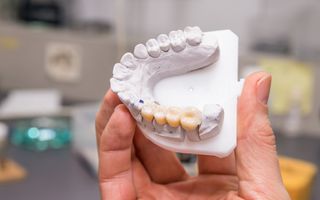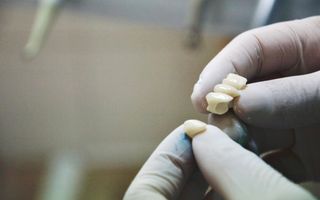
Are you missing one or more teeth? Is it affecting your ability to speak, eat, or smile? At National Dental Care Findon, we understand the importance of a healthy and complete smile. That's why we offer quality dental bridges to restore both the functionality and aesthetics of your teeth.
Our knowledgeable team is here to provide you with personalised care and is passionate about achieving the best results. Let us help you regain your smile and improve your oral health with a dental bridge.
What is a dental bridge?
A dental bridge fills a gap between your teeth with false teeth, but without ‘implanting’ them into your jaw like a traditional dental implant. Instead, as the name suggests, a bridge connects a false tooth to your natural teeth on either side of the gap.

They can be a good option if you prefer not to have a dental implant, or if your gums or jaw are not in the right condition to receive an implant.
The different types of dental bridges
Bridges are usually made from metal, porcelain, or zirconia (a very hard substance), or a mix of any of the three, and there are three types of dental bridges; Traditional, Cantilever, or the Maryland bridge.
- A traditional bridge is the most common and involves placing dental crowns on the teeth on either side of the gap and attaching a ‘pontic’ (a false tooth) between them.
- A cantilever bridge is less common. When there is only one tooth next to the gap, the dentist will place a crown over that tooth and attach the pontic to it. However, this method is less stable than attaching the pontic on both sides, which is why it’s not recommended for back teeth that bear a lot of pressure.
- The Maryland bridge style is named after the University of Maryland where it was invented. It’s similar to a traditional bridge, where a false tooth is attached to the teeth on each side of the gap. However, instead of using crowns, it uses 'wings' that attach to the back of each tooth next to the gap. It is important to note that this style is not recommended for back teeth and is only suitable for people with good oral health.

Advantages and disadvantages
The advantages of dental bridges
- Non-Surgical Alternative: Dental bridges offer a non sugical alternative to dental implants, which involve anchoring the tooth to the bone beneath the gum line. This may not be suitable for everyone, especially those with underlying gum or jaw issues.
- A Complete Smile: Missing teeth can impact your confidence and make you feel self-conscious about your smile. A bridge fills the gap left by missing teeth with a natural-looking solution.
- Restored Functionality: A dental bridge offers full functionality, meaning you’ll be able to eat, drink, and talk normally.
- Improved Oral Health: A missing tooth can cause your other teeth to deteriorate faster, as well as leading to tooth movement. A dental bridge can prevent this, resulting in better dental health.
The disadvantages of dental bridges
- Adjacent Teeth: Traditional bridges sometimes require crowns on healthy adjacent teeth, which may involve reshaping and covering them. This can lead to the removal of some healthy enamel and potentially cause lasting harm to initially healthy teeth.
- Risks of Maryland Bridges: Maryland bridges, while less invasive, can damage existing teeth due to the metal cemented at the back of the teeth. They are also less resilient to chewing pressure compared to other bridge types.
- Ineffectiveness Against Bone Loss: When a tooth is missing or removed, the jaw bone that previously supported it can start to deteriorate. Unlike implants, which have an artificial root anchored into the jaw bone, bridges sit above the gum line and don’t have roots. As a result, bridges don’t prevent bone loss like implants do.
- Shorter Lifespan: Dental bridges may not last as long as implants. A dental bridge will only last as long as the teeth that support it.If there are problems with these teeth in the future, such as decay or gum disease, the bridge will be compromised
It's important to think about these pros and cons when considering whether a dental bridge is right for you. Your dentist at National Dental Care Findon can help you make the best decision based on your individual circumstances.

How much does a dental bridge cost?
The cost of a dental bridge will vary depending on the type of bridge you get and the materials used, as well as some other factors. A traditional bridge generally requires two dental crowns, the pontic (the false tooth), and at least two dental appointments.
Keep in mind that your insurance may pay for some of the treatment, so it’s worth checking with your provider.
What to expect from your dental bridge treatment
From start to finish, here’s a typical dental bridge procedure at National Dental Care Findon:
- Have something to eat and drink before the procedure so you don’t get hungry
- Brush and floss your teeth
- Your dentist will start by applying a local anaesthetic to numb the area
- They will then remove a thin layer of enamel from the two abutment teeth
- Next, your dentist will take impressions or digital scans of your teeth to send to the lab
- This first appointment will finish with the dentist adding a temporary bridge to protect your teeth until you receive the permanent bridge
- Your next visit will occur approximately a week later, or whenever your custom-made bridge is ready
- Your dentist will again start by numbing the area with local anaesthetic
- They will remove the temporary bridge
- Next, they will test the fit of the permanent bridge
- If it fits well, they will fix it in place with dental cement
- Finally, they will shape the dental crowns and bridge to suit your bite
- The area will likely remain numb for several hours following the procedure
- Your dentist will check on the bridge during your next appointment
Looking to restore your smile? At National Dental Care Findon, we offer dental bridges to help you regain your smile and improve its functionality. Book a consultation with us and take the first step towards a beautifully restored smile.
Frequently asked questions
With proper care and regular check-ups at National Dental Care Findon, a dental bridge can last for up to 10 years or longer.
To ensure the longevity of your bridge, it is important to avoid biting down on hard or sticky foods that may damage or even dislodge the bridge.
What’s more, maintaining good dental hygiene is crucial to keep your natural teeth and gums strong, which in turn support the bridge.
Absolutely! Unlike dentures, Dental bridges are permanently fixed to your existing teeth, and cannot be removed without damaging them.

